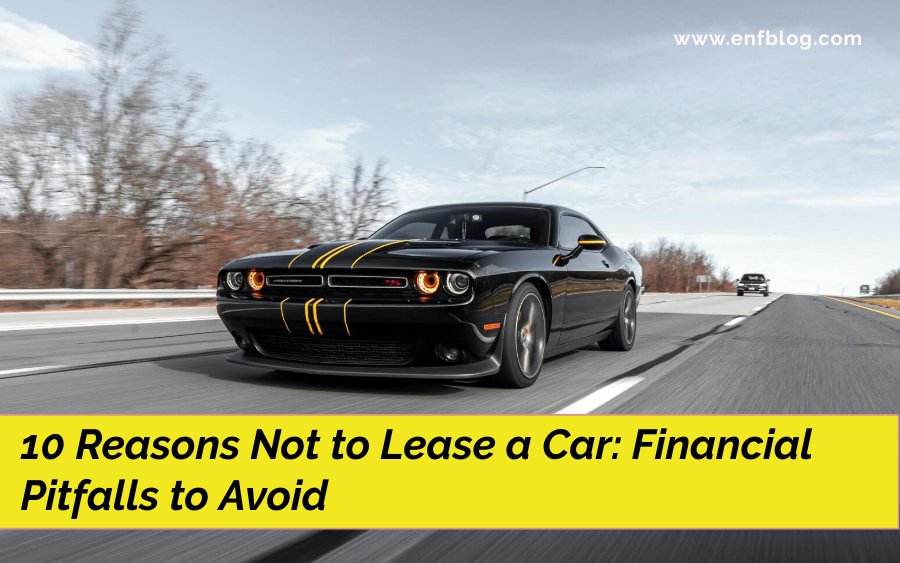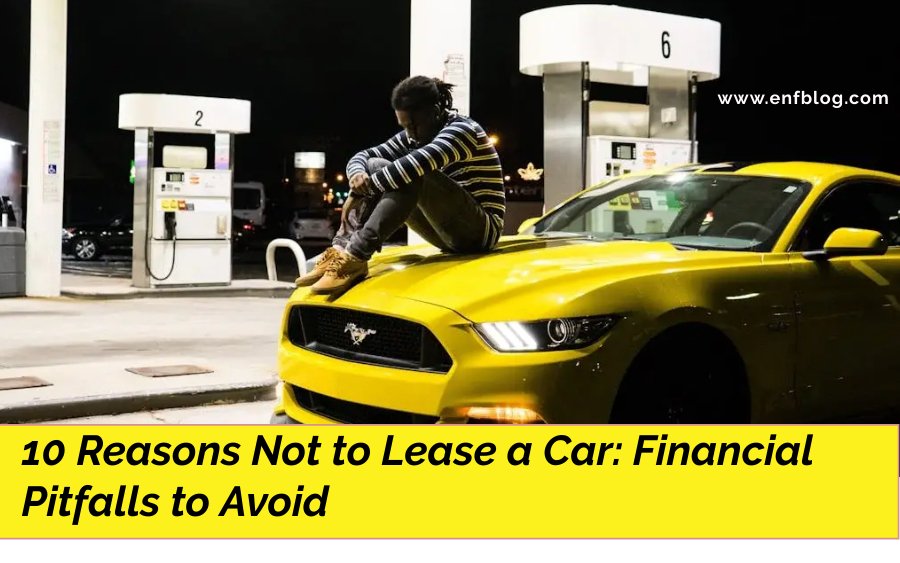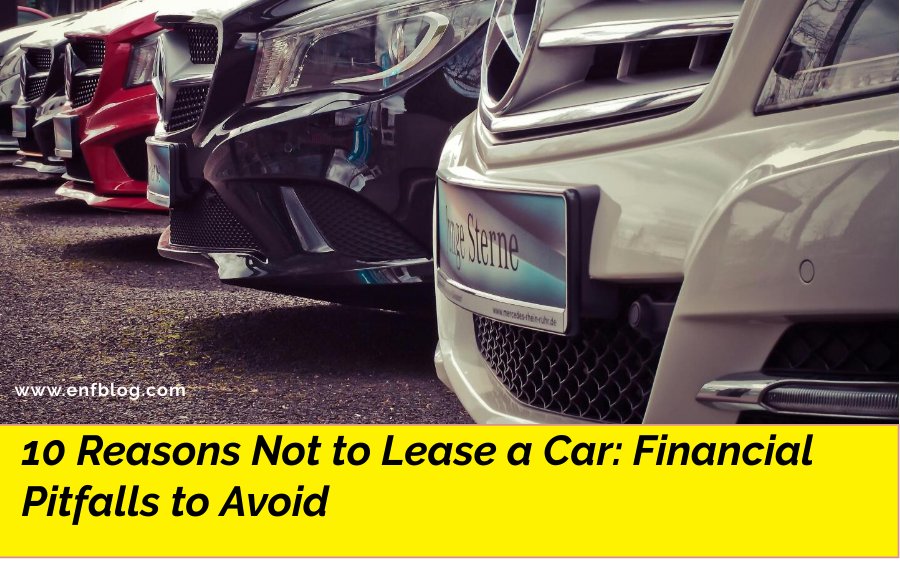10 Reasons Not to Lease a Car: Financial Pitfalls to Avoid
Table of Contents
Introduction
Leasing a car might seem like a convenient option at first glance. With lower monthly payments and the allure of driving a new car every few years, it’s easy to get drawn in.
However, beneath the surface, leasing can come with several financial traps that may not be immediately apparent. In this article, we’ll explore the 10 reasons not to lease a car and help you avoid the common pitfalls associated with car leasing.
The Illusion of Lower Monthly Payments
One of the most tempting aspects of leasing is the promise of lower monthly payments compared to purchasing a car. However, this is where the illusion begins.
While it’s true that monthly lease payments are often lower than loan payments for a purchased car, it’s important to recognize what you’re paying for.
When you lease, you’re essentially renting the car for a set period, typically two to three years. You’re paying for the car’s depreciation during that time, not building equity like you would with a purchase. Over time, this can cost you more, especially if you lease repeatedly.
Leasing vs Buying a Car

Buying is the most obvious alternative to leasing. Consider the various merits of these two options before looking at an alternative option you may not yet have considered.
Leasing:
- Most leasers never own their vehicle
- Usually requires a security deposit/down payment, as well as registration fees, etc.
- Higher interest rates but lower monthly payments than buying
- Difficult to break the contract
- Not possible to customize the car
- Maintenance, repairs, and insurance are generally the customer’s responsibility
- Depreciation of the vehicle doesn’t affect the driver
- Must calculate expected mileage and try to stick to limits
- May need to pay extra fees for excessive wear and tear
Buying:
- Buyers purchase and own an asset
- Often a high down payment, as well as registration and other fees
- High monthly payments but lower overall interest rates
- Can sell or trade-in at anytime
- Possible to fully customize the car
- Maintenance, repairs, and insurance are the buyer’s responsibility
- Need to consider vehicle depreciation/wear and tear
- Mileage is not a major consideration
Remember, buying a car means you’ll not only have the burden of a high down payment and monthly payments but you’ll also have the additional cost of ownership expenses that include insurance, maintenance and repairs, registration, and roadside assistance.
You’ll also need to deal with the depreciation and condition of the vehicle affecting resale value.
You Never Actually Own the Car
Unlike financing a car, where you eventually own the vehicle outright, leasing keeps you in a perpetual cycle of payments without ever owning the car. This is one of the top 10 reasons not to lease a car.
Ownership offers the freedom to sell, trade-in, or keep the car as long as you like. With a lease, however, you’re stuck with the terms of the contract, and at the end, you have nothing to show for all the money you’ve spent.
Costly Mileage Limits
Leasing contracts usually come with strict mileage limits, often ranging from 10,000 to 15,000 miles per year. If you exceed this limit, the penalties can be steep, typically between 15 to 25 cents per mile.
If you drive more than expected, these costs can add up quickly. For example, driving an extra 5,000 miles per year could cost you an additional $1,000 or more by the end of the lease. This is a hidden cost that can turn a seemingly good deal into a financial burden.
Excessive Wear and Tear Penalties
Another financial pitfall of leasing is the risk of being charged for excessive wear and tear. Leasing companies expect the car to be returned in near-perfect condition, with only normal wear and tear.
But life happens. Scratches, dents, or interior stains can result in costly fees when you return the car. Even if you’re meticulous, normal wear and tear can be subjective, and disputes over damage can be frustrating and expensive.
Limited Customization Options
If you’re someone who likes to personalize your vehicle, leasing might not be the best option for you. Leased cars must be returned in their original condition, which means no permanent modifications.
Whether it’s adding a new sound system, custom wheels, or even a fresh coat of paint, these are all off the table with a leased vehicle. The lack of freedom to make the car your own is another compelling reason to reconsider leasing.
High Insurance Costs
Leasing a car often requires you to carry higher levels of insurance coverage, which can significantly increase your monthly expenses. Leasing companies typically demand comprehensive and collision coverage with low deductibles to protect their investment.
While this provides peace of mind, it also comes at a cost. The higher premiums can quickly eat into any savings you might have gained from lower monthly payments, making leasing less financially attractive in the long run.
End-of-Lease Fees
At the end of your lease, you might be surprised by the additional costs that can crop up. Whether it’s fees for exceeding mileage limits, wear and tear charges, or even a disposition fee just for returning the car, these expenses can add up.
And if you decide you want to keep the car after the lease ends, the buyout price is often higher than the car’s market value, leaving you in a lose-lose situation. This is another reason why leasing isn’t always the best financial decision.
Limited Flexibility
Leasing contracts are typically rigid, with little room for flexibility. If your circumstances change—like needing to relocate, changing jobs, or needing a different type of vehicle—you may find yourself stuck in a lease that no longer suits your needs.
Breaking a lease can be costly, with early termination fees that can run into thousands of dollars. This lack of flexibility is a significant drawback and a key reason why many people advise against leasing a car.
Depreciation Doesn’t Work in Your Favor
When you lease a car, you’re paying for its depreciation during the lease term. However, if the car depreciates faster than expected, you don’t benefit from any potential savings.
Conversely, if you own the car, you have the opportunity to sell or trade it in, potentially recouping some of its value. Leasing, on the other hand, leaves you with no equity, and you’re at the mercy of the market.
The Long-Term Costs
Finally, one of the most important points to consider is the long-term cost of leasing versus buying. If you continually lease cars, you’re perpetually making payments without ever owning anything.
Frequently Asked Questions (FAQs) on Leasing a Car
1. Is it a bad idea to lease a vehicle?
Leasing a vehicle can be a bad idea if you’re looking for long-term value. While leases offer lower monthly payments, they don’t allow you to build equity in the car. Plus, you may face high fees for exceeding mileage limits or wear and tear. If you prefer flexibility and ownership, buying might be a better option.
2. Why is leasing a car bad?
Leasing a car can be problematic due to hidden costs, such as high insurance premiums, end-of-lease fees, and restrictions on customization. Additionally, you’re left with nothing at the end of the lease term, which can make it more expensive in the long run compared to purchasing a vehicle.
3. Why shouldn’t you lease a car?
You shouldn’t lease a car if you plan to drive more than the mileage limits or if you want to own your vehicle eventually. Leasing ties you to a strict contract, and breaking it can result in hefty fees. For those who want more control over their vehicle, buying is often a better choice.
4. Why is leasing a car a bad idea?
Leasing can be a bad idea because it often leads to higher overall costs. While the upfront and monthly payments are lower, you’ll never own the car, meaning you’ll have to keep leasing or purchase a vehicle at the end of the lease. This can add up to more than the cost of buying a car outright.
5. Is leasing a car a bad idea?
Leasing a car might be a bad idea if you value long-term financial stability. The lack of ownership, combined with potential fees for mileage, wear and tear, and early termination, can make leasing more expensive over time.
For those looking for a cost-effective solution, buying a car might be the better route.
6. How does leasing a car affect your credit?
Leasing a car affects your credit similarly to financing a purchase. On-time payments can boost your credit score, while late payments can negatively impact it. However, because you don’t own the car, it won’t contribute to your net worth.
7. Can you buy a car after leasing it?
Yes, many lease agreements offer a buyout option at the end of the term. However, the buyout price is often higher than the car’s market value, so it’s essential to calculate whether it’s worth it compared to purchasing a similar used car.
Case Study: How Leasing Cost More Than Buying – A Real-World Example

Background: John, a 35-year-old professional from California, was drawn to the idea of leasing a brand-new luxury car. The appeal of lower monthly payments and driving a new model every few years seemed like the perfect fit for his lifestyle. With this in mind, he decided to lease a car instead of purchasing one.
Initial Costs: John leased a high-end sedan for $500 per month with a 36-month lease term. This included a down payment of $3,000 and a mileage limit of 12,000 miles per year. The dealer also required comprehensive insurance, which increased his monthly expenses.
The Pitfalls:
- Mileage Limits: John’s work required unexpected travel, leading him to exceed the mileage limit by 10,000 miles over the lease term. The penalty? An additional $2,000 at lease-end.
- Wear and Tear: Despite taking good care of the car, normal wear and tear charges amounted to $800 due to minor scratches and interior stains.
- End-of-Lease Fees: John decided not to lease another vehicle from the same dealer. He was hit with a $500 disposition fee for returning the car.
- Insurance Costs: The required comprehensive insurance added an extra $100 to his monthly budget, which was higher than what he would have paid for a similar used car.
- No Equity: After three years, John realized that despite spending nearly $25,000 (including the down payment), he didn’t own the car. To buy it out at the end of the lease, he would need to pay $28,000, which was more than the car’s market value.
This real-life example underscores the 10 reasons not to lease a car and why it’s essential to consider the long-term financial implications before entering into a lease agreement.
Final Thoughts: Think Long-Term
While leasing may offer short-term benefits like lower monthly payments and driving a new car every few years, the long-term financial implications can be significant. From never owning the car to dealing with mileage limits, wear and tear fees, and higher insurance costs, the drawbacks of leasing can outweigh the benefits.
these 10 reason not to lease a car If you’re considering leasing, it’s essential to look beyond the surface and consider the long-term costs. By understanding the potential pitfalls, you can make a more informed decision that aligns with your financial goals.
Note: I am here to help-if you’d like me to write a blog for you, feel free to contact us.

Post Comment